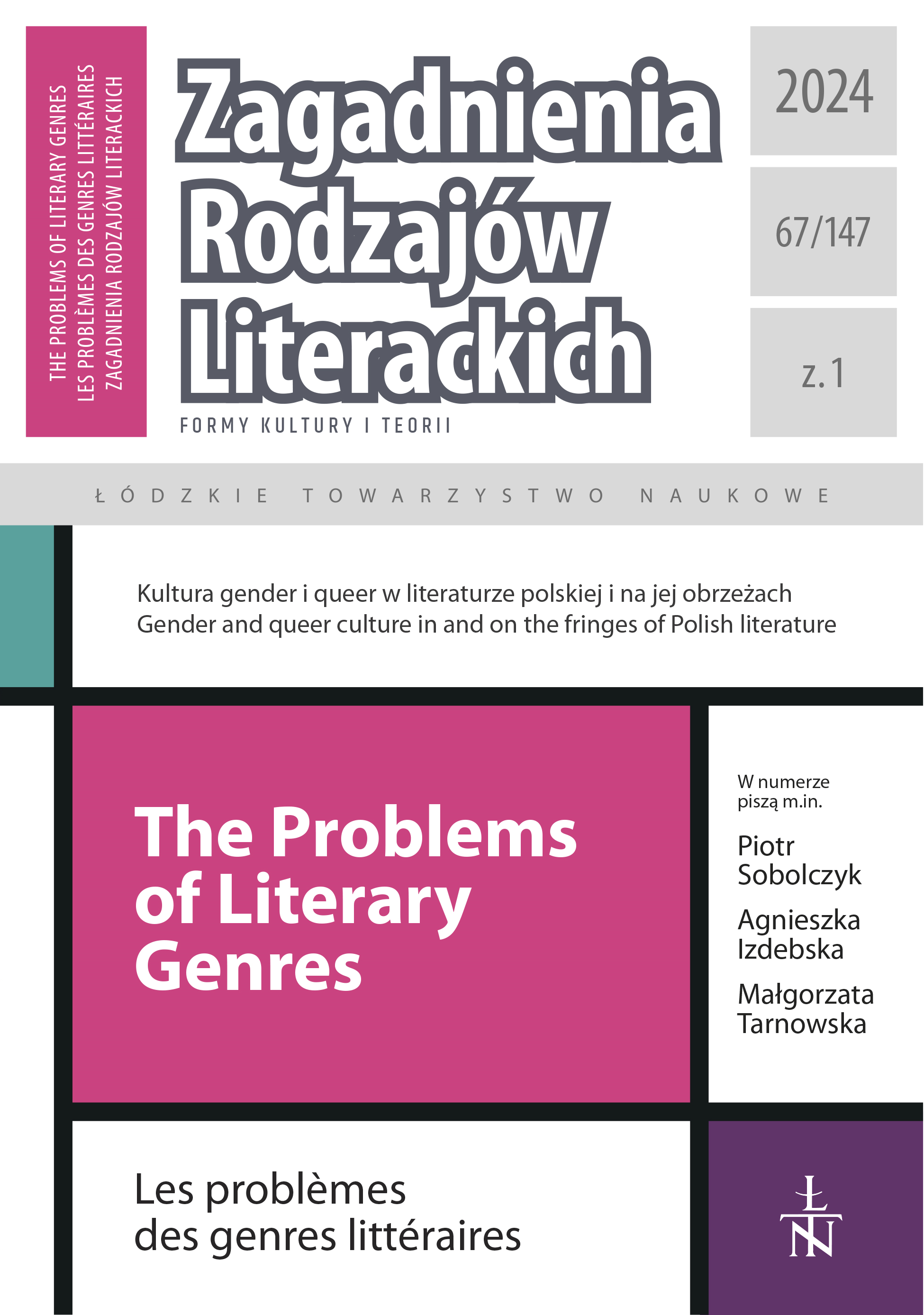Lesby, gejki, postlesbijki. Konstrukcje tożsamości lesbijskiej w polskiej prozie najnowszej
DOI:
https://doi.org/10.26485/ZRL/2024/67.1/11Słowa kluczowe:
lesbian studies; lesbian identity; queer studies; queer literature; lesbian literatureAbstrakt
Lesbian identity is one of the central issues of lesbian studies since the 1990s. A reading of classic works by Tamsin Wilton, Celia Kitzinger, Tracy Morgan or Rosa Ainley shows that this category has been analyzed and viewed as deeply ambivalent all along: on the one hand suspicious in light of deconstructionist efforts to dismantle all essential identities, on the other, desirable as an important tool in the process of emancipation and overcoming patriarchal discourse with its inscribed drive to erase — to use Adrienne Rich’s term — lesbian existence. In Polish literature, especially in contemporary prose which interests me in this article, the question of this identity has become increasingly important over the past two decades with the increasing presence of queer women writers in the literary mainstream. While works from the late 20th and early 21st centuries focused mainly on highlighting and exposing mechanisms of its production by depicting “ordinariness” of lesbian life, works published today are distinguished by a markedly different attitude to gender and sexual identity. The subject of the article is an analysis of contemporary (21st-century) Polish prose in terms of ways in which lesbian identity is constructed, using two texts as examples: Moja ukochana i ja [My beloved and me] by Renata Lis and Nie wszyscy pójdziemy do raju [We will not all go to paradise] by Olga Górska. I will analyze the issue of the title in three areas. First, I will consider how the authors (born in 1970 and 1988, respectively) describe discourses (political, medical, cultural) on lesbianism that shape their texts’ narrators’ self-knowledge. Second, I will discuss how the authors describe themselves in relation to the category “lesbian,” linking it to contemporary intellectual discourses on lesbian and post-lesbian identity. Third, I will consider what prospects for queer solidarity in Poland are opened up by these opposing (as it will turn out) propositions.
Liczba pobrań
Bibliografia
LESB.COM (b.r.), Krytyka Polityczna, warszawa.krytykapolityczna.pl/dzialanie/program--o-wspolpracy/100lesb-com [dostęp: 5.02.2024].
Ainley Rosa (1995), What Is She Like? Lesbian Identities from the 1950s to the 1990s, Continuum International Publishing Group Ltd., Londyn.
Ben Hagai Ella (2021), Is Lesbian Identity Obsolete?, „Journal of Lesbian Sutdies” nr 25(1).
Ben Hagai Ella (2022), Changes in Lesbian Identity in the 21st Century, „Current Opinion in Psychology” nr 49(4).
Butler Judith (2008), Uwikłani w płeć. Feminizm i polityka tożsamości, przeł. K. Krasuska, Wydawnictwo Krytyki Politycznej, Warszawa.
Byrska Olga (2018), Atest na lesbijstwo, „Dwutygodnik” nr 6, www.dwutygodnik.com/artykul/7899-atest-na-lesbijstwo.html [dostęp: 5.02.2024].
Cała siła, jaką czerpię na życie. Świadectwa, relacje, pamiętniki osób LGBTQ+ (2022), red. J. Bednarek, P. Laskowski, S. Matuszewski, Ł. Mikołajewski, M. Sobczak, Wydawnictwo Karakter, Kraków.
Czapliński Przemysław (2009), Polska do wymiany. Późna nowoczesność i nasze wielkie narracje, W.A.B., Warszawa.
Dezorientacje. Antologia polskiej literatury queer (2021), red. A. Amenta, T. Kaliściak, B. Warkocki, Wydawnictwo Krytyki Politycznej, Warszawa.
Eribon Didier (2019), Powrót do Reims, przeł. M. Ochab, Wydawnictwo Karakter, Kraków.
Jaworska Sara (2023), Pisanie szeptem? O najnowszej poezji lesbijskiej, „Czas Kultury” t. 39, nr 4.
Kitzinger Celia (1987), The Social Construction of Lesbianism, Sage Publications, Londyn.
Kowalska Alicja (2011), Polish Queer Lesbianism: Sexual Identity Without a Lesbian Community, „Journal of Lesbian Studies” nr 15(3).
Gajewska Agnieszka (2014), Lesbianizm [w:] Encyklopedia gender. Płeć w kulturze, red. A. Grodzka, M. Rudaś-Grodzka, K. Nadana-Sokołowska, A. Mrozik, K. Szczuka, K. Czeczot, B. Smoleń, A. Nasiłowska, E. Serafin, A. Wróbel, Wydawnictwo Czarna Owca, Warszawa.
Giacomuzzi Anastasja, Tal Hadas (2022), Post-Lesbian Tensions: A Qualitative Inquiry of Lesbian Identity, „The Journal for Unergraduate Ethnography” nr 12(1).
Górska Olga (2022), Nie wszyscy pójdziemy do raju, Wydawnictwo Drzazgi, Warszawa.
Guess Carol (1995), Que(e)rying Lesbian Identity, „The Journal of Midwest Mordern Language Association” t. 28, nr 1.
Lis Renata (2017), Lesbos, Wydawnictwo Sic!, Warszawa.
Lis Renata (2018), Lesbijka w cudzysłowie, „Dwutygodnik” nr 2, www.dwutygodnik.com/artykul/7638-lesbijka-w-cudzyslowie.html [dostęp: 29.02.2024].
Lis Renata (2023), Moja ukochana i ja, Wydawnictwo Literackie, Kraków.
Mizielińska Joanna (2006), Płeć. Ciało. Seksualność. Od feminizmu do teorii queer, TAiWPN Universitas, Kraków.
Morgan Tracy (1993), Butch-Femme and the Politics of Identity [w:] Sisters, Sexperts, Queers: Beyond the Lesbian Nation, red. A. Stein, Plume/Penguin, Nowy Jork.
Rich Adrienne (1979), It Is the Lesbian in Us… [w:] A. Rich, On Lies, Secrets, and Silences, W.W. Norton and Co., Nowy Jork.
Rich Adrienne (2016), Przymus heteroseksualności a egzystencja lesbijska, przeł. A. Kamińska [w:] A. Rich, 21 wierszy miłosnych, przeł. J. Głuszak, Biuro Literackie, Stronie Śląskie– Wrocław.
Szulc Łukasz (2018), Transnational Homosexuals in Communist Poland. Cross-Border Flows in Gay and Lesbian Magazines, Palgrave Macmillan, Nowy Jork.
Tate Charlotte C. (2012), Considering Lesbian Identity from a Social-psychological Perspective: Two Different Models of „Being a Lesbian”, „Journal of Lesbian Studies” nr 16(1).
Tate Charlotte C. (2022), Is Lesbian Identity Obsolete? Some (Limited) Answers and Further Questions from a Unique Philology of Human Behavioral Science Perspective, „Journal of Lesbian Studies” nr 26(3).
Warkocki Błażej (2007), Homo niewiadomo. Polska proza wobec odmienności, Wydawnictwo Sic!, Warszawa.
Whisman Vera (1993), Identity Crisis: Who is a Lesbian, Anyway? [w:] Sisters, Sexperts, Queers: Beyond the Lesbian Nation, red. A. Stein, Plume/Penguin, Nowy Jork.
Wolfe Susan J., Penelope Julia (1993), Sexual Identity/Textual Politics [w:] Sexual Practice/Textual Theory: Lesbian Cultural Criticism, red. S.J.
Wolfe, J. Penelope, Blackwell, Cambridge, MA.
Pobrania
Opublikowane
Jak cytować
Numer
Dział
Licencja
Prawa autorskie (c) 2024 Łódzkie Towarzystwo Naukowe i autorzy

Utwór dostępny jest na licencji Creative Commons Uznanie autorstwa – Użycie niekomercyjne – Bez utworów zależnych 4.0 Międzynarodowe.







